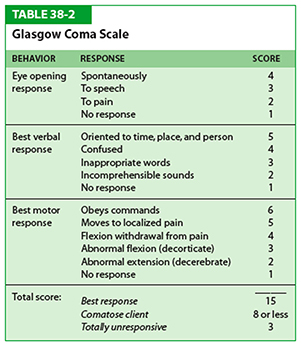 The Glasgow Coma Scale, also known as GCS, is a numbered system used by medical professionals and doctors in order to determine the level of consciousness of patients who have suffered a head injury or traumatic brain injury. The scale, which goes from three to 15, is often used by emergency responders, EMS, doctors, nurses, and others who work with those who are recovering from a brain injury.
The Glasgow Coma Scale, also known as GCS, is a numbered system used by medical professionals and doctors in order to determine the level of consciousness of patients who have suffered a head injury or traumatic brain injury. The scale, which goes from three to 15, is often used by emergency responders, EMS, doctors, nurses, and others who work with those who are recovering from a brain injury.
The Glasgow Coma Scale takes three different patient responses into consideration: verbal response, motor response, and eye response. Each of these three responses is graded on a scale of one to five, with one being the least conscious and five being most conscious. A person who is in the deepest coma has a GCS score of 3, while a full conscious and alert person has a GCS of 15.
If a head injury victim does not open their eyes under any circumstances, they are given one point on the scale. If they open their eyes only in response to pain, they are given a two. If they open their eyes when someone addresses them, they are given a three. If they open their eyes voluntarily, they are given a four.
If a traumatic brain injury victim is not able to make any sounds, they are given a one on the GCS scale. If they are able to make noises but not form words, they are given a two. If the head injury victim can speak, but can only make exclamations or say random words, they are given a three. A score of four is appropriate when the head injury victim can speak but is highly confused. A score of five is given if the patient can converse easily.
If a head injury patient has no motor movement, he or she is given a one on the Glasgow Coma Scale. A patient is given a two through four score depending on his or her response to pain. A patient is given a five if he or she can appropriately respond to commands with motor movements.
If you or a loved one has suffered a traumatic brain injury, please reach out to the Virginia Beach injury lawyers to review your case.